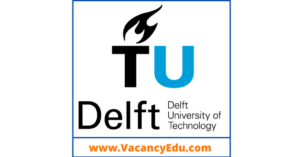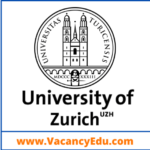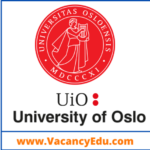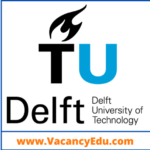Delft University of Technology (TU Delft), Netherlands invites online Application for number of Fully Funded PhD Degree at various Departments. We are providing a list of Fully Funded PhD Programs available at Delft University of Technology (TU Delft), Netherlands.
Eligible candidate may Apply as soon as possible.
(01) PhD Degree – Fully Funded
PhD position summary/title: PhD Position Software Restructuring
We are seeking two PhD Students to join the Spoofax team to (1) extend the theory and application of scope graphs to the specification of programmable software restructurings, (2) develop analogs to scope graphs for capturing and transforming control flow, (3) develop a software restructuring framework for the C++ programming language based on this framework, and (4) validate the restructuring infrastructure through restructuring production C++ code at Philips Healthcare.
Deadline : 30 June 2022
(02) PhD Degree – Fully Funded
PhD position summary/title: PhD position Complementarity Mechanisms in Complex Network
As a Ph.D. student, you will study complementarity mechanisms in complex networks under supervision of Dr. Maksim Kitsak and Prof. Van Mieghem.
Your work will be at the intersection of network theory, network embeddings, and network inference. A possible application domain is the Science of Science.
Deadline : June 1, 2022
View All Fully Funded PhD Positions Click Here
(03) PhD Degree – Fully Funded
PhD position summary/title: PhD position: Understanding practices and stakeholder experiences of patching security in organizations
We are looking for a motivated researcher interested in collecting and analyzing various types of data from within the partner organizations—such as interviews, surveys, ticketing systems, and incident logs—to understand the organizational and technical practices around patching.
Deadline : Open until filled
(04) PhD Degree – Fully Funded
PhD position summary/title: PhD: Role of the cytoskeleton in cell membrane electroporation and cargo translocation
We offer an inspiring, supportive and collegial environment. The Koenderink lab is an experimental biophysics lab studying the mechanobiology of cells and tissues. We combine concepts and techniques from soft matter physics, biophysics, synthetic biology, protein engineering, and cell biology. The Koenderink lab is embedded in the TU Delft Department of Bionanoscience, which focuses on the fundamental understanding of biological processes from molecule to cell. The department features an inspiring, international environment with access to state-of-the art facilities for nanofabrication, a microscopy facility, molecular/cell biology, biochemistry, and high-performance computing for image processing.
Deadline : 30-05-2022.
Polite Follow-Up Email to Professor : When and How You should Write
(05) PhD Degree – Fully Funded
PhD position summary/title: PhD Position ERC ACC-3D multi-scale modelling of auxetic cementitious composites
Concrete is inherently brittle. This is a problem because important structures such as nuclear power plants need ductility to remain functional after earthquakes and impacts. Auxetic Cementitious Composites-3D (ACC-3D) aims at creating novel, ductile cementitious composites by using local reinforcement architectures with an unusual quality, negative Poisson’s ratio, known as auxetics.
Deadline : May 15th 2022
(06) PhD Degree – Fully Funded
PhD position summary/title: PhD Position Modeling Cardiac Tissue Growth and Remodeling
Heart failure is a progressive chronic condition under which heart tissues undergo detrimental changes in structure and function across multiple scales in time and space. Given the role that biomechanical stimuli play in the onset and progression of these remodeling processes, cardiac restraint devices are seen as a promising treatment strategy. However, given the limited understanding of the underlying cardiac tissue behavior, current designs fail to successfully counteract pathological remodeling in the long term.
Deadline : May 15th, 2022
Click here to know “How to Write an Effective Cover Letter”
(07) PhD Degree – Fully Funded
PhD position summary/title: Physico-chemistry of nuclear molten salt fuel and corrosion products
The project will involve both experimental work and thermodynamic modelling by the CALPHAD method. The experimental investigations will include solid state synthesis, characterisation using techniques such as X-ray and neutron diffraction, X-ray absorption spectroscopy, measurement of thermodynamic properties using calorimetric techniques. Moreover, corrosion tests will be performed of selected structural materials (e.g. steels) in contact with selected salt mixtures. The microstructure and morphology will subsequently be investigated by microscopy techniques, while the composition of the salt will be scrutinized by chemical analysis techniques. To further understand the corrosion processes, electrochemical experiments (potentiodynamic tests) will be carried out to correlate the changes in the microstructure with the material’s corrosion resistance, including Scanning Electrochemical Microscopy or Scanning Kelvin Probe Force Microscopy.
Deadline : Open until filled
(08) PhD Degree – Fully Funded
PhD position summary/title: PhD Position Innovative Polder Water Management in the Dutch Coastal Delta
A 4-year PhD position, financed by the Dutch Science Foundation (NWO), is available within the recently awarded research project AGRICOAST: Climate-resilient agriculture in the Dutch salinizing coastal delta: innovative water management, adaptive agriculture, and promising transition pathways. AGRICOAST intends to develop various water management and water saving solutions to climate-proof agriculture in the Dutch coastal delta. A total of 4 PhD positions & 1 PDEng position in varying scientific and engineering disciplines are available now including the one advertised here.
Deadline : May 9th 2022
(09) PhD Degree – Fully Funded
PhD position summary/title: PhD Position Subsurface Water Storage in the Dutch Coastal Delta
A 4-year PhD position, financed by the Dutch Science Foundation (NWO), is available within the recently awarded research project AGRICOAST: Climate-resilient agriculture in the Dutch salinizing coastal delta: innovative water management, adaptive agriculture, and promising transition pathways. AGRICOAST intends to develop various water management and water saving solutions to climate-proof agriculture in the Dutch coastal delta. A total of 4 PhD positions & 1 PDEng position is available in varying scientific and engineering disciplines, including the one advertised here.
Deadline : 9 May 2022
(10) PhD Degree – Fully Funded
PhD position summary/title: PhD Multimodal, AI-Driven Process Monitoring of Cold Spray for Rapid Diagnosis and Repair
Cold spray is an exciting but little known new metal deposition technique, which can offer great benefits for repair of aircraft components. It offers the ability to repair parts that are currently unrepairable and in future could be used to manufacture completely new parts. Within this project you will help develop cold spray into an automated repair technology for the aerospace sector. The aim of the project is to develop an AI system which receives data from multiple sensor types to predict the final properties of a repair. Your activities will include selecting suitable sensors, understanding the link between sensor data and repair properties, and developing AI algorithms which can extract the required information from the sensor data. The project will therefore involve a mix of experimental and modelling work, as well as algorithm development
Deadline : May 1, 2022
Connect with Us for Latest Job updates
(11) PhD Degree – Fully Funded
PhD position summary/title: PhD Position Basin-scale geology of the Paleozoic of the south-eastern Netherlands and surroundings
The PhD project we offer focusses on the geology of the Paleozoic (Devonian-Caroniferous) rock succession in South Limburg, the Netherlands and neighbouring countries. The project aims to considerably improve the understanding and (hydrostratigraphic) characterization of the subsurface, to produce an improved 3D geological model focussed on Paleozoic stratigraphy, structural setting and (hydrostratigraphic) rock properties. This will be done by collating and using legacy data and producing new data, which will be integrated into a comprehensive geological model. Legacy data comes from various sources and will be collected in collaboration and consultation with specialists in each field. New data include seismic 2D lines and data from the new tTEM system, a ground-based method for electromagnetic data acquisition that allows for very efficient ground-penetrating surveys to identify faults and other geological structures. Moreover, new smart boreholes are planned within the project targeting key lithological transitions to validate the geological interpretation of seismic lines, which are key to building the geological model. Existing boreholes and new boreholes will be sampled for age determination and rock physical properties to populate the geological model. Distributed Acoustic and Strain Sensing cables will be implemented in legacy and new boreholes to measure static and dynamic rock strains. If feasible, these systems may further be used in tunnels and outcrops. Last, noise interferometry will be applied in collaboration with KNMI on continuous seismic recordings.
Deadline : May 1st 2022
(12) PhD Degree – Fully Funded
PhD position summary/title: PhD position ERC ViSioN: Virus Spread in Networks
The project “Virus Spread in Networks” (ViSioN) is funded by ERC as an Advanced Grant 2020. ViSioN starts from a Network Science view on virus spread in networks in which the duality between the virus transmission process and the contact graph is key. The devastating Corona crisis reveals two major shortcomings in traditional epidemiology. First, it ignores the human contact graph and implicitly assumes a homogeneous population without specific graph structure. Second, most models for the virus spreading process relate to a Markovian setting, with exponential infection and curing times, leading to an exponential decay of the epidemic. Measurements, however, point to significantly different infection and curing time distributions. In addition, digital technology can help in constructing the contact graph and combined with medical testing, all infected can be detected. ViSioN aims to develop the theory of non-Markovian epidemic process on networks, a surprisingly missing element today, because non-Markovian theory is needed to tell, based on the characteristic infection and curing times of the virus, how long a pandemic will last and when the peak occurs. Next, ViSioN will combine all available measurement technologies to construct the best possible contact graph via temporal networking or adaptive networking. Finally, ViSioN will explore how accurately infections can be predicted under partial information of process and contact graph.
Deadline : May 1st, 2022
List of Top 25 Free Statistical Analysis Software
(13) PhD Degree – Fully Funded
PhD position summary/title: PhD Position in experimental wind farm control
In wind farms the wind turbines operate on an individual level, therefore each wind turbine optimizes its own power production, resulting in sub-optimal power output at wind farm level due to the wake effect. Within academia, novel actuation strategies are investigated that have a positive effect on wake mixing, and thus reducing the overall wake losses within wind farms. On the 15th of November 2019, the HELIX concept for wind farm flow control was introduced by the TU Delft. In this concept, novel actuation techniques using individual pitch control (IPC) are employed to significantly enhance wake mixing
Deadline : 1 May 2022
(14) PhD Degree – Fully Funded
PhD position summary/title: PhD Position in high-precision opto-mechanical microchips to analyse cell bio-mechanics
In this project, we aim to utilize silicon photonics and optomechanical microchip technology to realize the next-generation platform for cell analysis. This revolutionary opto-mechanical sensory systems can be used to study cells by dynamically measuring their morphological, mechanical, and molecular properties at high speed, high resolution, and in 3D. To create such novel sensory systems, you will use concepts based on integrated photonics (chips that work with light), opto-mechanical sensing (sensing mechanical deformations with light), biomaterial engineering (materials with different shapes and stiffnesses that give mechanical cues to cells), and high-resolution 3D bio-printing. The research includes all aspects of designing, characterizing, fabricating, and incorporating opto-mechanical sensory systems in biomedical devices.
Deadline : May 1st 2022
(15) PhD Degree – Fully Funded
PhD position summary/title: PhD Position Navigational Integrity for Autonomous Surface Ships
In this research project, Navigational Integrity for Autonomous Surface Ships, there is a PhD position for four years. Safety expressed in terms of accuracy, availability, continuity and integrity are among the key criteria for all autonomous systems. A big challenge for the future autonomous surface ships technology is to show that an unmanned system is at least as safe as a manned one. This problem includes a few elements such as avoidance of collisions with other ships and obstacles, safe ship navigation, and their real-time monitoring depending on weather conditions such as wave height, wind speed, wind direction and wave period. Integration of a series of on-board sensors and external factors are key elements of safe navigation. Among them the GNSS systems working in different setups such as D-GNSS, SBAS, NRTK, assisted GNSS and signals of opportunity, combined with other sensors such as magnetometer, acoustic, gyro, inertial, radar, laser and optical sensors along with integrated ocean observing systems (IOOS) can provide valuable source of information.
Deadline : 30 April 2022
(16) PhD Degree – Fully Funded
PhD position summary/title: AI Futures PhD Position 1/4 (New human-AI interactions)
Position 1) Developing design techniques and strategies that envision and create respectful interactions with AI technology based on understanding human practices in future work. From a technical point of view, how can we design physical objects, organisational structures and digital spaces in a way that highlight issues of justice and respect and promote ideas to address them? What are the key AI affordances that support decentralised workplace dignity, and the generation and maintenance of healthy professional and personal relationships. This will lead to new human-AI interactions, and new ways to configure existing interactions with AI along respectful and just lines. (Faculty of Industrial Design Engineering, Daily Supervisor: Dave Murray-Rust).
Deadline : April 24, 2022
(17) PhD Degree – Fully Funded
PhD position summary/title: PhD Position Integrated Electrochemical Recycling of Carbon Fibre and CO2
This project will involve both modeling and experimental activities. Modeling work will include simulating the electrochemical reactions at the anode and cathode and multiphase flow in various processing setups in COMSOL. Experimental work will include testing selected electrolytes, concentrations and processing conditions to study the relationship between operating conditions and electrochemical reactions. The recycled carbon fibers and hydrocarbons will be characterized using a set of techniques (i.e., scanning electron microscopy (SEM), Fourier transform spectroscopy (FTIR), Raman Spectroscopy, X-ray photoelectron spectroscopy (XPS), and mechanical tests). Ultimately, these lab-scale experiments will be used to design and build a dedicated electrochemical cell for C/CO2 recycling.
Deadline : April 21st, 2022
(18) PhD Degree – Fully Funded
PhD position summary/title: PhD Position Environment Perception for Self-Driving Vehicles
The PhD position addresses multi-modal environment perception (i.e. vision, radar, LiDAR sensing) in urban traffic scenarios, with a focus on Vulnerable Road Users (pedestrian, cyclists and other riders). Several interesting research directions are possible – the use of machine learning / deep learning techniques is omnipresent. One possible direction addresses “data efficiency” and the shortcomings of current supervised learning approaches, which require lots of (costly manually) annotated training data. Unsupervised/semi/self-supervised learning, auto-annotation, and domain adaptation techniques are avenues of interest. Other possible directions involve novel models for 3D semantic scene analysis and road user motion prediction.
Deadline : 20 April 2022
(19) PhD Degree – Fully Funded
PhD position summary/title: PhD position on ‘Conceptual engineering in the philosophy of technology’
Throughout history, technology has been a driver of social change. The technologies of the industrial revolution played a crucial role in shaping modern society, and society has since then continued to be shaped by technological innovations. Some technologies not just change specific domains or practices for which they were designed but affect our lives in a much broader sense.
This PhD project will develop appropriate criteria for changing or adapting concepts in response to SDTs. The project will draw on a broadly functionalist account of concepts, using insight from theoretical and practical philosophy (esp. metaethics and epistemology) and the philosophy of technology.
Deadline : April 20th 2022
(20) PhD Degree – Fully Funded
PhD position summary/title: PhD position on mass transport modelling from GRACE/GRACE-FO data
This research aims at providing novel mass transport products derived from space-borne gravimetric data coming from past, current, and future missions. This is achieved by innovative methodology, namely by uniquely constraining the data from these missions to geophysical models, thereby combining the strength of the underlying physical knowledge contained in such models and maximising the spatiotemporal resolution of the satellite on-orbit observations. Auxiliary information, such as precipitation records or altimetry data, will establish a suitable temporal evolution, and topography and surface properties will predict a realistic spatial mass distribution.
Deadline : April 15th, 2022
(21) PhD Degree – Fully Funded
PhD position summary/title: PhD: High Reynolds number flows for wind turbines
The main objective of this project is to study the aerodynamic performance of airfoils at representative Reynolds numbers for modern wind turbines. The study will be initiated by an experimental campaign in the low turbulence wind tunnel at TU Delft, regularly used for this purpose. The pressure distribution, lift and drag of airfoils in different operational states (both clean and rough, steady and unsteady) will be obtained at medium Reynolds numbers, to gain insight in the behaviour and important parameters. The experimental campaign will be completed using a unique pressurized wind tunnel to provide novel data at ultra-high Reynolds numbers for a few selected interesting cases. The second part of this project will evolve towards understanding the physics of high Reynolds number flows and its role on the performance and load assessment of wind turbines. The limitations and applicability of the existing state-of-the-art (low-order) tools will be evaluated. Finally guidelines will be defined on how to incorporate high Reynolds number effects into the design process
Deadline : 15-4-2022
(22) PhD Degree – Fully Funded
PhD position summary/title: PhD position Safe and Efficient Traffic of Connected Vulnerable Bicyclists and Automated Vehicles
Transportation of the future will include a mixture of automated vehicles (AVs) and vulnerable road users (VRUs), like bicyclists and pedestrians. Unregulated mixing of automated vehicles into urban areas has the potential to cause a rise in transportation related death and injury. This mixing also exacerbates safety concerns for vulnerable road users. Current VRU detection and its associated trajectory planning are based on information that is collected solely from AV sensors which is not sufficient to accurately predict the near-future behavior of vulnerable road users. We want to validate the hypothesis that digital information sharing among all road users combined with physiologically and dynamically realistic predictive models can guarantee overall safety. Our project goal is to achieve safe and socially acceptable interactions among automated vehicles and vulnerable bicyclists in dense urban environments by leveraging information shared in a two-way vehicle↔bicycle (V2B/B2V) communication system.
Deadline : 14 April 2022
(23) PhD Degree – Fully Funded
PhD position summary/title: PhD position on Biophysics of single-molecule nanopore scanners
Nanopore technologies are exciting emerging platforms for high-resolution biomolecule sensing and sequencing. On one hand, they enable important discoveries in fundamental biology at the single-molecule level and, on the other hand, they show great promise for applications in molecular diagnostics. In our group we develop multifunctional nanopore setups with the goal of combining high-throughput and high-resolution sequencing capabilities. In this interdisciplinary project you will develop acoustic resonators to manipulate and detect single molecules in nanopore devices.
Deadline : April 8st, 2022
(24) PhD Degree – Fully Funded
PhD position summary/title: PhD position Predicting Extreme Events in Complex Work Environments
This PhD position leverages the fields of cognitive robotics, human-robot interaction, data science, and probability and statistics concerning extreme events. The combination of these research fields is promising for predicting and potentially preventing critical and extreme events in complex work domains that involve human-robot interactions based on large amounts of sensed data.
Deadline : 8 April 2022
(25) PhD Degree – Fully Funded
PhD position summary/title: PhD position in Mixed-Signal IC Design for Battery-Free Wearables
This PhD project will focus on a near-infrared spectroscopy (NIRS) system for cerebral hemodynamics monitoring, which is fully powered by multi-source energy harvesting strategies for autonomous operation. The PhD candidate will investigate innovative solutions in (1) the analogue front-end architecture for learning-based compressed sensing and (2) the power management unit for multi-source energy harvesting, to push the state-of-the-art in wearable systems for continuous monitoring of feature-rich vitals.
Deadline : April 3, 2022
(26) PhD Degree – Fully Funded
PhD position summary/title: PhD position Using AI to automate choice modelling – Unravelling model building and data collection strategies
This project aims to push the frontier of choice modelling. Specifically, it envisions to develop novel AI approaches to unravel, assist, improve and even automate the steps and decisions taken by choice modellers to collect and analyse choice data. It involves both components of knowledge representation and reasoning as well as mathematical modelling and statistics. Envisioned methodologies in this project include, interviews with experts, scientometrics, choice modelling, experimental design, supervised learning and reinforcement learning.
Deadline : 3 April 2022
(27) PhD Degree – Fully Funded
PhD position summary/title: PhD Candidate in Governance and gaming for quantum-safe PKI
Transition towards hybrid quantum-safe information exchange is both a technical and a governance challenge. Governance is context-specific, and a deep understanding of both the technology and the organizational setting is needed. This PhD trajectory aims to develop governance models for guiding organizations to move their systems into a Quantum-Safe future. This includes investgating suitable governance structures, institutional design, responsibilities, liabilities. The models should capture multi-level governance in which at least the organizational, industry, national and EU levels will be considered. As part of the governance, a game needs to be developed to create awareness of the risks and the need for being quantum-safe. Furthermore, a game can show alternative solutions for becoming quantum-safe and in this way, facilitate learning about quantum-safe solutions.
Deadline : 31 March 2022.
(28) PhD Degree – Fully Funded
PhD position summary/title: PhD position on fusion bonding thermoplastic composites
We aim to advance the integration and joining of thermoplastics composites with an concerted effort of several PhDs contributing towards a new approach to fusion bonding, combining process and performance optimization by simulations of physical phenomena and process monitoring using artificial intelligence. This PhD vacancy will explore novel approaches in induction welding, based on polymer matrices functionalized with nanoscale superparamagnetic particles. You will develop experimental methods to functionalize high temperature polymers and elucidate the structure property relationship to serve as a base for scalable fusion bonding technologies
Deadline : March 31st 2022
(29) PhD Degree – Fully Funded
PhD position summary/title: PhD position Origami-based Flexible Architected Materials for High-Tech Equipment
The semiconductor industry expectations for lithography machine performance demand ever-increasing capabilities, such as throughput, lifetime, cleanliness, sustainability, and precision for mechatronic systems. One of the key construction elements in high-tech mechatronic systems is flexible (i.e. compliant) mechanisms. Unlike their rigid-body counterparts, they allow motion in the desired directions enabled by their slender parts which deform elastically. Due to their monolithic nature, cleanliness, and predictability, they are desired in precision applications. Despite these advantages, flexible mechanisms are one of the main road blockers for high-tech mechatronic systems to achieve higher throughput, i.e. higher process speed and acceleration. This is due to their inherent drawbacks such as limited range of motion for a given design volume and low load bearing capacity (i.e. support stiffness).
Deadline : 31 March 2022
(30) PhD Degree – Fully Funded
PhD position summary/title: PhD The design, building, testing and integration of a highly efficient, miniaturized space qualified RF chain for driving AOTFs during space-missions
TU Delft is looking for an ambitious PhD candidate to work at the Faculty of Aerospace Engineering, within the Space Systems Engineering section. The PhD candidate will contribute to the development of future miniaturized space-based instrumentation, used for remote sensing. Remote sensing from space is frequently used to obtain details about the Earth’s surface. This technique enables a periodic observation (imaging) of aspects related to hydrography, agriculture, geology, mineralogy and land use. The use of Acousto-Optical Tunable Filters (AOTFs) for spectral imaging/optical wavelength selection offers many advantages compared to other techniques, such as a good spectral resolution, excellent robustness and compactness. Past, current and future scientific (ESA) space missions make use of this device for observations in different optical wavelength domains. AOTFs are made of different types of material, depending on the optical wavelength domain in which they need to filter. Especially in the Ultra-Violet, no dedicated efficient space-qualified AOTF exists yet. The PhD candidate is encouraged to explore this new field, assess the requirements and to assist in the further strengthening of collaborations between different partners.
Deadline : 1-04-2022
(31) PhD Degree – Fully Funded
PhD position summary/title: PhD: 3D Unsteady CFD model for Multi-Rotor Multi-Body Fluid Structure Interaction
The main objective behind this project is to develop a 3D Hybrid solver implemented in OpenFOAM purposed for lift-driven aerodynamics such as in wind energy and aircraft. More specifically, this PhD project focuses on the addition of fluid-structure interaction capability by introducing a combination of domain deformation and partitioned fluid-structure coupling methods. In a region close to solid boundaries the flow, the full Navier-Stokes equations are solved on a deforming (meshed) domain and coupled to a structure dynamics model (possibly with an arbitrary turbulence model or DNS, the limitations being the computational power and the physical properties of the flow); outside of that region, the flow is solved with a Lagrangian (meshless) vortex particle method. In this hybrid approach, the complexity and size of the deforming mesh problem is substantially reduced as it is only required for a small domain close to the body. Also, interaction between different bodies moving in each other’s vicinity is facilitated through the Lagrangian (meshless) vortex particle.
Deadline : 31-3-2022
(32) PhD Degree – Fully Funded
PhD position summary/title: PhD Position AshCycle – Turn waste-ashes to resource via structural concrete
In this project you are expected to work in a large EU consortium AshCycle which deals with integration of underutilized ashes into material cycles by industry-urban symbiosis. The incineration of biomass, municipal solid waste and sewage sludge produces significant quantities of ashes in the EU: approximately 25 million tons annually. These residues have currently no use or they are utilized only in low-value applications. Major problems with the use of incineration residues in the construction, water treatment, and other industries are insufficient public awareness of the safety and environmental acceptability of the final products , the lack of uniform regulations, and readiness of the market to accept incineration residues as a supplementary material. The project AshCycle with 28 European partners will demonstrate and implement industry urban symbioses revolving around the underutilized ashes to reach circular and climate neutral economy in Europe. Pilots and replication demonstrations will be carried out in Denmark, Finland, Belgium, The Netherlands, Croatia, Slovenia, Switzerland, and South Africa.
Deadline : 30 March 2022
(33) PhD Degree – Fully Funded
PhD position summary/title: PhD Position Utilization of MSWI bottom ash and biomass ashed in concrete by industry-Urban Symbiosis
Currently, incineration ashes of municipal solid waste (MSW), biomass and sewage sludge are usually landfilled or underutilized in Europe. To increase resource efficiency and circularity, the European HORIZON-RIA project “AshCycle (Integration of underutilized ashes into material cycles by industry-urban symbiosis)” aims to develop and demonstrate regional Industrial-Urban Symbiosis (I-US) concepts for utilization of incineration residues by extracting metals, nutrients, rare earth elements (REEs) coupled with using the mineral residues as secondary resources in construction and wastewater treatment products. The project will be implemented by 28 European partners, including universities, research institutes and enterprises, etc. We seek a PhD candidate to work on pre-treatment methodologies of different incineration ashes, and development of alkali-activated concrete with incineration ashes based on technical requirements for different pilot demonstrations. Reaction kinetics and microstructure development will be investigated to provide fundamental basis for improved mechanical properties and long-term performance of alkali-activated concrete. With the research outputs, technical guidelines and recommendation for low-carbon circular construction materials and products will be proposed. The PhD candidate will work at Microlab of TU Delft in collaboration with other partners involved in the AshCycle project.
Deadline : 30 March 2022
About Delft University of Technology (TU Delft), Netherlands –Official Website
Delft University of Technology, also known as TU Delft, is the oldest and largest Dutch public technical university. Located in Delft, Netherlands, it is consistently ranked as one of the best universities in the Netherlands, and as of 2020 it is ranked by QS World University Rankings among the top 15 engineering and technology universities in the world.
With eight faculties and numerous research institutes, it has more than 26,000 students (undergraduate and postgraduate) and 6,000 employees (teaching, research, support and management staff).
The university was established on 8 January 1842 by William II of the Netherlands as a Royal Academy, with the primary purpose of training civil servants for work in the Dutch East Indies. The school expanded its research and education curriculum over time, becoming a polytechnic school in 1864 and an institute of technology (making it a full-fledged university) in 1905. It changed its name to Delft University of Technology in 1986.
Dutch Nobel laureates Jacobus Henricus van ‘t Hoff, Heike Kamerlingh Onnes, and Simon van der Meer have been associated with TU Delft. TU Delft is a member of several university federations, including the IDEA League, CESAER, UNITECH International and 4TU.
Disclaimer: We try to ensure that the information we post on VacancyEdu.com is accurate. However, despite our best efforts, some of the content may contain errors. You can trust us, but please conduct your own checks too.
Related Posts
- 05 PhD Degree-Fully Funded at University of Bergen, Bergen, Norway

- 23 PhD Degree-Fully Funded at University of Zurich, Switzerland

- 11 PhD Degree-Fully Funded at Swansea University, Wales, United Kingdom

- 10 PhD Degree-Fully Funded at Maastricht University, Netherlands

- 18 PhD Degree-Fully Funded at University of Groningen, Netherlands

- 10 PhD Degree-Fully Funded at University of Oslo, Norway

- 26 PhD Degree-Fully Funded at Delft University of Technology (TU Delft), Netherlands

- 26 PhD Degree-Fully Funded at University of Dundee, Scotland, United Kingdom

- 05 PhD Degree-Fully Funded at Utrecht University, Netherlands











